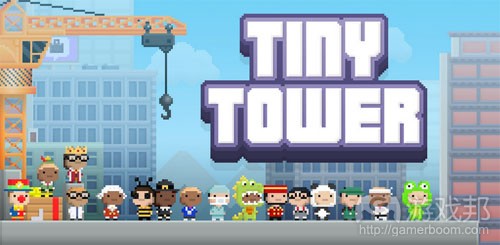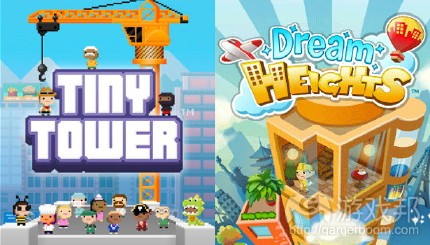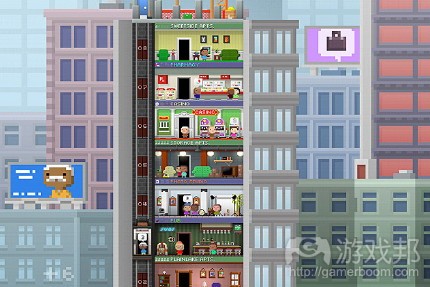Nimblebit联合创始人谈游戏成功秘诀及运营理念
作者:Will Luton
在过去几年里独立游戏开发者Nimblebit已经创造了许多成功的游戏,而最突出的要数去年6月所发行的塔楼建造游戏《迷你大楼》。
Mobile Pie(游戏邦注:独立游戏开发商)的Will Luton与该工作室的联合创始人David Marsh就其成功秘诀以及他们的发展目标展开了交谈。
Will Luton:当我说我将与Nimblebit展开对话时很多人都让我问这个问题,即“为什么你们会如此特别?”因为你们已经创造出了许多开发者所梦寐以求的热门游戏。
David Marsh:这是一个很难回答的问题。我并不希望别人认为我们过于狂妄,但是不得不承认的是所有的成绩都不是无中生有。从2008年App Store开始接受开发者提交的游戏以来我们便开始面对这一平台创造游戏。
直到现在我们已经创造出了14或15款应用了。我们已经长时间坚定于该发展方向了,不断推出新应用并从每一款应用中吸取经验教训,明确哪些元素是可行的哪些又是不可行的。
有些应用彻底失败了,而有些应用如我们所愿获取了成功,我们希望通过每一次的努力去构建我们自己的品牌意识和用户基础。随后我们便创造了《口袋青蛙》,这款游戏比之前的任何一款游戏都来得成功,并能够推动着我们朝着更大的成功而努力。
这是一种狂热的发展过程。我并不清楚比起App Store中的其它优秀的开发者我们有何特别之处。虽然运气很重要,但是如果你的游戏能够吸引苹果,特别是应用审查委员会的人员,这将对游戏今后的发展非常有利。
几乎我们的每一款游戏都曾获得App Store的推荐,而这一点对于我们的成功更是功不可没。这并不是依靠我们自己的力量便能够获得的成功,我们必须想尽办法去促成这种成功。这便是成功的关键要素之一。
Luton:你们的总部设在哪里?你们是否会与苹果展开定期的会议商讨?
Marsh:不会,最近我们都是每个月以电话的形式与苹果进行交涉,而在此之前我们也从未与他们进行过任何会议商讨。
我们的总部设在圣地亚哥,所以我们根本不可能定期与苹果的员工进行会面。
Luton:据我们所了解苹果总是不会过多干涉开发者的工作,因为他们希望能够保持自己的编辑独立性,你是否认为这是一件好事?
Marsh:如果你能因与苹果中的某些人保持良好关系,从而让自己的游戏获得推荐优势,那么这个市场未免就太不公平了。我认为苹果在处理这方面事情上非常老练,这也不失为一个良好的策略。
Luton:我想这一点很容易会让苹果的推荐饱受争议,因为如果有些人的游戏频繁得到推荐,那么其他人便会猜想其中是否存在何种端倪。
Marsh:苹果一直都在努力做到公平公正,所以才很少陷入诸如此类的丑闻中。他们总是会基于自己的标准去选择那些有所突出的应用。据我所知他们并未与任何开发者建立起官方关系——尽管我也清楚这一说法并不完全准确。
Luton:这其中肯定不包含我们公司。你们公司只有3名员工是不是?
Marsh:没错。在去年8月前我们还只有2个人在奋斗,即包括我和我的兄弟Ian,而在8月份我们又迎来了另外一名程序员,也就是我们的一位好朋友。
可以说我们一直承受着超负荷的工作量,为了确保每一款游戏的即时更新我们不得不夜以继日地处理各种问题,所以我们认为是时候在寻找一名帮手了。最终我们便组成了现在的3人团队。
Luton:这是否是一次巨大的飞跃?
Marsh:人员增加并未改变我们的工作环境,因为我们与Tim是非常要好的朋友关系,我们也无需对他进行培训。但是如果在此之前我们是停滞发展的话,这种改变也许就是一大飞跃。
Luton:看着你们从付费模式向免费模式转变是一个非常有趣的过程,可以说这已经变成了所有开发者的最终发展方向,《口袋青蛙》是否是你们的第一款免费游戏?
Marsh:是的,这是我们的第一款免费游戏。在尝试了一款街机类游戏《Scoops》后我们最终决定转向免费游戏,并尝试着在游戏内部销售不同的主题,也就是所谓的免费模式。
Luton:这款游戏看上去并不是标准的免费游戏。也就是它与Zynga那些要求所有玩家同时做某事的游戏并不相同。
我们创造了一款等距游戏并添加了一些不同的游戏内容,如地理定位,如此为玩家创造了更加有趣的体验,而你们却创造了更具创造性的飞跃。
你们一直致力于完善业务模式并创造更多新内容。
Marsh:其实对于这款游戏我们并未进行详细的规划。在此之前我们使用了同样的青蛙主题发行过一款类似的游戏,即《Dizzy Pad》(游戏邦注:得到了较高的评价),只是这款游戏还属于街机游戏。
我们在游戏中设置了各种不同的青蛙让玩家进行收集,并且玩家可以通过获得成就去打开下一个关卡。
而对于《口袋青蛙》,我们希望玩家能够在此寻找并收集各种不同类型的青蛙。
其实起决定作用的还是时机。因为那时候的我们想要尝试免费游戏,所以我们便制作了这款有关青蛙的免费游戏。我们也未对此做出详细的规划。我们只是一如往常地致力于这款游戏的制作,而最终它也取得了很好的成绩。
Luton:这款游戏始终保持着不错的成绩,我们也从不觉得这是你们偶然的想法。有时候人们制作的免费游戏并不是复制其他人的游戏,只是碰巧其中的游戏元素与现有的游戏中的某些内容相似而已。
对于开发者来说这是一个巨大的转变,因为你不仅在接触一种全新的商业模式,同时你还必须想办法让新内容更有效地融入这种模式中。你们一直都是以创造性发展而备受关注。你认为在今后几年时间里免费游戏将发生何种改变?
Marsh:我认为业务模块一直都是我们的软肋,因为我们并未拥有明确的拱形策略,我们也不清楚所有游戏的业务发展目标是什么。我们一直都只专注于游戏中,并不断尝试着创造出玩家真正想要看到的游戏。
不管游戏会取得何种成绩,我们一直在思考着可以添加哪些内容去促成这款免费游戏。也许它会比之前的游戏更加出色。
我的意思是,尽管《迷你大楼》取得了比《口袋青蛙》更大的成功,但是我们的下一款游戏却不一定会超越《迷你大楼》。当我们开始致力于游戏的创造时我们并未着眼于任何盈利元素。
Luton:关于Zynga复制你们的《迷你大楼》这一新闻已经占据手机游戏新闻报告的大面积篇幅。
Marsh:这点让我们很吃惊。我们之所以会做出这一抱怨只是单纯地想嘲讽Zynga,这是我们面对好友的一种宣泄,并未打算将其公诸于众。但是最终却成为了全天下的瞩目焦点。
Luton:但是报道中却未提及你们团队对于这一事件的态度。能否跟我们说说你们最初看到Zynga那一款游戏时的想法?
Marsh:我们并未做出太过激进的反应,也未感到吃惊或觉得自己被出卖。因为在Zynga中有我们所认识的人,所以我们已经事先了解了相关情况。
我们唯一感到惊讶的是游戏的相似度竟然如此高,因为一开始我们认为他们可能只是基于《迷你大楼》这一主题进行创作。而当我们越深入游戏时我们则发现了越多相近的机制。
你可以从我们所写的一封短信中看到我们的态度。不过这件事并未对我们造成多大影响。我们根本没有时间去纠结于此事,因为光是创造下一款游戏就有够忙的了。
Luton:你是否认为这是一场零和游戏,即只有一定量的玩家会玩Zynga的这款游戏?
Marsh:当然不是,这也是为何Zynga能够侥幸成功的原因。
《Dream Heights》并未对我们的收益造成消极影响。我不认为这款游戏会对我们造成威胁,但是不得不承认的是,尽管Zynga创造出了如此多的衍生游戏,他们也仍然能够取得巨大的成功。
Luton:当我第一次接触《Dream Heights》时我已经玩过《迷你大楼》了,而我对这款游戏的第一印象则是其华丽且完善的外观,我想其背后肯定有一支极其强大的开发团队。
Marsh:的确,他们一直都在利用大量的人才去组装出这样的游戏,而这一点正是我最反感的。
我想游戏产业中的所有人都清楚,无数人才都被Zynga收入旗下,或者大多数人都是在一些被Zynga所收购的公司旗下效命。
他们是这个产业的主导力量,我一直都认为那些复制别人游戏的设计师都没有多少技能,或者还只是新手,所以他们只是将制作这类型游戏当成学习实践。
而最让我郁闷的则是Zynga拥有许多非常有才能的设计师——因为我之前曾与这些人一起共事过,只是他们最后都进入了Zynga。
我很难过地意识到他们接收到的任务是“这里有一款游戏,请做出与之相似的游戏”而不是“这里有一种游戏类型,一个基本的游戏理念,你能以此制作出怎样的游戏”。
对于我们来说游戏开发中最激动人心的一部分便是一开始只是面对一个基本理念,然后基于团队成员的个性以及他们所拥有的技能,游戏将逐渐发展起来,并最终呈现出一个完整的作品。
而Zynga可能只会说,至少是面对那些致力于《迷你大楼》的人来说,这只是游戏开发过程中的一个可选择环节而非必要步骤。
Luton:这真的是一种人才浪费的行为。
Marsh:再同意不过了。
Luton:自从出现游戏复制事件后你们的名气出现了大幅度的上涨。
Marsh:好像是这样的。
Luton:你对此有何想法呢?
Marsh:我的心情很复杂。因为我们并不希望以这种方式被大众所认识。我希望用户是因为我们的游戏认识我们,而非因为一家大型游戏公司模拟了我们的游戏才认识我们。
自那以后我已经快被无数采访请求烦透了。我希望别人能够对我们接下来的项目感兴趣,而不是一味地询问一些有关其它公司的内容。
可以说这一负面新闻深深地伤害了我们。
Luton:从一开始你们便是独立进行游戏创造?你们从未采取过任何融资活动?
Marsh:我们从未进行过任何筹集资金的活动。不过我们也的确遇到不少想要进行投资的风险投资公司,甚至也有些公司透露出了收购意愿。
因为我们总是全身心地投入于每一天的工作上,专心地处理着游戏开发的每一个细节,特别是在面对最近的成功,我们更是感受不到任何阻碍我们发展的威胁,所以我们才未多加考虑融资或收购问题吧。我们只是想要做自己想做的事而已,而融资和收购便有可能破坏我们的这种自由。
Luton:所以这便是该公司目前的境况?这便是你们现在的生活。
Marsh:这是我们一直坚持的努力目标。过去三年里我们一直基于这一方向而努力,并且现在我们也获得了更大的成功了。这便是我们的目标,指引着我们进行每一天的工作并致力于任何我们想要创造的内容。
我们也可以随时改变前进方向,甚至某一天我们可能会突然决定不再制作应用而致力于其它完全不同的项目中。自由地决定该做些什么便是我们一直坚持着的终极目标。
(本文为游戏邦/gamerboom.com编译,拒绝任何不保留版权的转载,如需转载请联系:游戏邦)
Dev-on-Dev: Nimblebit
by Will Luton
Mobile Pie’s Will Luton speaks to Nimblebit co-founder David Marsh about running the small indie outfit
Indie developer Nimblebit has had a number of successes over the last few years, breaking onto the scene with the ever-popular tower building game Tiny Tower last June.
Mobile Pie’s Will Luton caught up with the studio’s co-founder David Marsh about the secrets of its success and what it hopes to achieve going forward.
Will Luton: Somebody said to me when I mentioned I was going to speak to Nimblebit, ‘why are you guys so special?’ Yet you guys have had a string of hits that most mobile devs would dream of.
David Marsh: Yeah, that’s a hard question to answer. I don’t want to feel like we’re self-important or anything like that but it’s not anything that came out of nowhere. We’ve been making apps for the App Store since they started accepting submissions in 2008.
We’re up to like 14 or 15 apps now. We kind of soldiered along for a long time, putting app after app out there and trying to learn from each one and seeing what worked and what didn’t.
Some were complete flops and some got a little bit of critical success of we tried to build off that each time, build our brand awareness and customer base. Then we came out with Pocket Frogs, which was a bigger hit than any of our previous games and that set us up for even more success.
It’s been kind of a wild ride. I don’t know if we’re any more special than any of the other pretty talented developers in the App Store. I think a lot of it does come down to luck but also getting people at Apple, especially on the App Review Board, to be fans of your games helps a lot.
All of our games have been featured somewhere on the App Store which is definitely no small part of why we’ve had our success. That’s not something we were able to just do, it just worked out that way. That was a big part of it.
Luton: Where are you guys based? Do you get regular meetings with Apple?
Marsh: No, recently we got a contact at Apple that we get on the phone with once a month or so but before that we never really had any kind of official relationship with them.
We still don’t really. We’re based in San Diego so it’s not like we get to see any Apple employees on a regular basis.
Luton: What we’ve experience with Apple is that they are kind of hands off. They keep a distance away from developers because they want their editorial independence, which is quite a good thing, right?
Marsh: It would be a meat market if it was just like anyone could get a good relationship with someone at Apple and automatically have favourite status and get all their stuff featured. I think they’re pretty diplomatic about it on purpose and that’s probably a good strategy.
Luton: I think it keeps them quite controversy free because you could imagine a situation where someone was getting regular feature status, it would seem that was quite corrupt.
Marsh: Yeah they definitely try to be impartial so they‘re not in the middle of any scandals or stuff like that. They just stand away and pick and choose from what they think stands out. As far as I know, there’s no official relationship that they have with any developer, although I’m sure that’s not totally true.
Luton: Certainly not with us. There are just three of you, right?
Marsh: Yes. Up until August of last year it was just me and my brother Ian but in August we hired another programmer, who was a good friend of ours, to help out.
We kind of get burdened down with the more games that we have out there, with support issues and just keeping all of our titles up to date, so we thought it would be nice to have someone else to help us out. So yeah, we’re up to three now.
Luton: Has that been a big leap?
Marsh: I don’t think it’s changed the environment for us that much because we’re really good friends with Tim who works with us now. We do not have to train someone, but if we grew anymore past that, it would definitely be more of a bigger change.
Luton: As a creative, it was interesting to see you guys flip from paid to freemium, which is standard and what everyone else did, but Pocket Frogs, was that your first freemium game?
Marsh: Yes, from the start it was our first freemium game. We experimented with our other game Scoops, which is more of an arcade type game, that we eventually set to free and then we tried selling different themes inside the game so that was kind of freemium. Pocket Frogs was our first, from the start, free-to-play game.
Luton: That game is not a formulaic free-to-play game. It’s not a Zynga-esque free-to-play game, which is what everybody else was doing at the time and certainly what we were doing at the time.
We made an isometric game that had some other stuff on it, like location stuff, which did some cool interesting things, but you guys came out and did something which was, creatively, a massive leap.
So you were working out the business model and doing something new.
Marsh: We didn’t really come at it from a big picture approach. We had just released a similar game called Dizzy Pad before that which used the same frog theme, only it was an arcade game, a high score game.
We had all these little collectable different frogs in there that you could unlock by getting achievements.
Our focus for Pocket Frogs, making a game that was more centred around finding and collecting all these different types of frogs.
Then it was just the timing. It was around the time that we wanted to try out free-to-play and so we made a game about frogs that was free-to-play. It wasn’t really that well planned out or anything like that. We went ahead with it and it did pretty well.
Luton: It played quite consistently. It didn’t feel like it was tacked on. Sometimes people who do free-to-play create games that are, not clones, but creatively very similar to other stuff out there.
For developers, it’s a big shift because you’re learning a new business model as well as how that stuff fits creatively. You guys are known for moving that forward creatively. Where do you think free-to-play is going the next few years?
Marsh: I think in some ways we’re really bad at the business side of it because we don’t have real huge over arching strategies and we don’t have clear visions for the business side of all these games. We focus on the game and then try to make something that a lot of people are going to want to play.
Based on whatever that game happens to be we try to figure out what kind of things we can integrate into it to allow it to be a free-to-play game. Sometimes it works better than others.
I mean Tiny Tower was a lot more successful than Pocket Frogs and maybe next time our game won’t be as successful as Tiny Tower. We don’t approach it from that monetisation standpoint when we’re just setting out to make the game first.
Luton: Clone games. It’s been one of the stories in mobile that’s had a huge amount of coverage.
Marsh: Yeah, surprisingly. When we made that little image to poke fun at Zynga, it was just more a cathartic thing we were doing for ourselves because we wanted to say something just to our friends, not necessarily the entire world. But it ended up getting picked by every news source under the sun. It’s pretty overwhelming.
Luton: The thing that doesn’t get reported on is how teams feel emotionally when these kinds of things happen to you. What was your reaction when you first saw it?
Marsh: We didn’t have a super strong emotional reaction. We didn’t feel shocked or betrayed. We kind of had a heads up and we knew it was coming. We had heard from some other people that worked at Zynga that it was in the works so we weren’t totally surprised by it.
We were kind of just a little bit taken aback at just how close of a clone it was because we thought it would just be based on Tiny Tower with the same basic theme. But actually, the more we played it, the more it was really pretty close mechanically to our game.
You could see our emotion through the little letter we wrote, poking fun at them. Past that, it didn’t really affect us a whole lot more. We didn’t really spend too much time thinking about it, we were busy working on our next year.
Luton: Do you see it as a zero sum game where there’s only X amount of people who will play it?
Marsh: Probably not, which is why they had no problem getting away with it.
I don’t think we’ve seen any kind of downturn in our revenue because of Dream Heights. I don’t think it’s devastating to us but that’s definitely why they can put out a lot of derivative games and still flourish.
Luton: When I first played Dream Heights having played Tiny Tower a lot, my initial reaction was that it’s quite polished and nice and a there was clearly a talented team behind that, right?
Marsh: Yeah, I mean it takes talent to put together any kind of game like that, which is actually the most annoying thing about it personally to me.
I think everyone who works in this industry knows multiple people that have gotten snapped up by Zynga or have gone to work at companies that have been bought by Zynga.
They are pretty much the predominant force in this industry and so I think a lot of people clone games because the don’t have the skill to design their own game or they’re very new to making games and they’re using it as kind of a learning exercise or something like that.
The annoying part to me was that I know that there are lots of really talented people at Zynga because I used to work with them and they all went to work at Zynga.
It’s just kind of sad for me to think that they would all get tasked with just ‘here’s a game, make something exactly like it’ instead of ‘here’s a genre, a basic idea, what can you come up with?’
The most exciting part of game development for us is just starting with that small nugget at the beginning, and based on the personalities of the people on the team and they’re skills, seeing it evolve and grow and see what you come up with by the end of everything.
For Zynga, it’s almost like they’re just saying, at least for the people that worked on Tiny Tower, that it’s an optional part of game development and not a necessary step.
Luton: It’s talent squandered.
Marsh: I would agree with that.
Luton: Your notoriety has risen quite a lot since then.
Marsh: It appears so.
Luton: How does that feel?
Marsh: I don’t know. I have mixed feeling about it because that’s not really why I would like to be known. I would like to be known for our games and not because we got cloned by a much bigger company or something like that.
We did get tons of requests for interviews about it, which was annoying. I’d rather have people want to talk to us to see what we’re doing next, not for what some other company did.
I guess there’s always the saying there’s no such thing as bad publicity and it hasn’t hurt us, that’s for sure.
Luton: You guys have been going under your own steam since day one right? You’ve never taken any finance?
Marsh: We’ve never taken any funding or anything like that. We’ve been approached by a lot of venture capital firms wanting to invest and people wanting to straight out acquire the company.
Since our focus is just about doing the every day, nitty gritty of making games and, especially with our latest successes, we never felt any kind of crunch keeping the team going, we didn’t really see the point of taking funding or getting acquired. We’re already doing exactly what we want so it would just get in the way.
Luton: So this is it now? This is your life.
Marsh: This has been our goal this whole time. These last three years we’ve been doing it the whole time. It’s just only now that we’ve been a little bit more successful at it. That’s the goal, is that we have our own office and everyday we get to go in and work on whatever we want.
We could change track on whatever we’re doing at anytime, or change direction or decide one day to stop working on apps and do something totally different. Just to have the freedom to do all that kind of stuff is really the end goal of all of this.(source:develop-online)










































 闽公网安备35020302001549号
闽公网安备35020302001549号